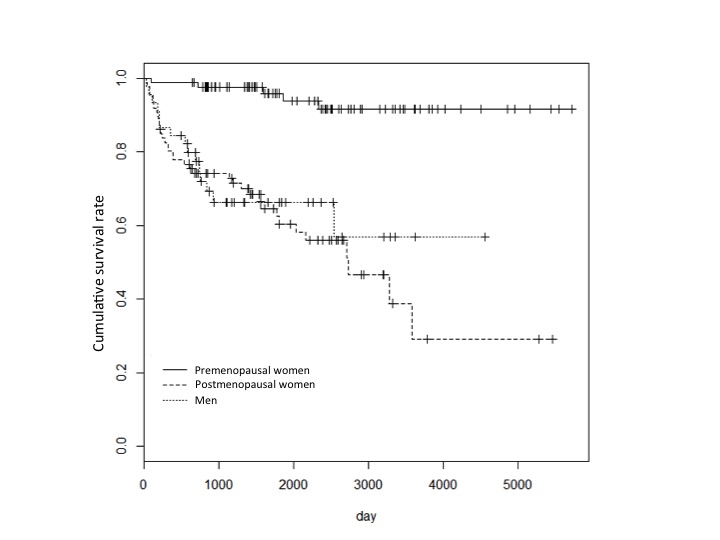Session Information
Date: Sunday, November 8, 2015
Title: Osteoporosis and Metabolic Bone Disease - Clinical Aspects and Pathogenesis Poster
Session Type: ACR Poster Session A
Session Time: 9:00AM-11:00AM
Background/Purpose: To
evaluate the incidence of fragility fractures associated with
high-dose glucocorticoid therapy in patients with systemic rheumatic
disease.
Methods: A
retrospective study of patients who were treated with high-dose prednisolone (more
than 0.8 mg/kg) for systemic rheumatic disease at Kobe University Hospital from
April 1988 to March 2012. The primary outcome was a major osteoporotic fracture
(defined as a clinical vertebral, hip, forearm, or proximal humerus fracture) after high-dose glucocorticoid
therapy. For postmenopausal women and men over 40 of
age, the patient’s fracture risk at the beginning of high-dose
glucocorticoid therapy was assessed by the World Health Organization’s Fracture
Risk Assessment Tool (FRAX).
Results: Of
229 patients (median age: 49 years), 57 suffered a fragility fracture during
the observation period (median observation period: 1558 days). Of 84
premenopausal patients, 5 suffered a fracture. In contrast, of 86
postmenopausal female, 36 suffered a fracture. Fragility fractures
were far more frequent than predicted by the FRAX
score. Bisphosphonate use did not reduce the risk of fragility fractures.
Patients with FRAX scores over 8.3% had a particularly high risk of fracture.
Conclusion: Fragility fractures associated
with high-dose glucocorticoid therapy are common among postmenopausal
women. Bisphosphonate does not prevent fragility fractures in patients
undergoing high-dose glucocorticoid therapy. Alternative drugs should be
considered as a first-line prophylactic measure.
To cite this abstract in AMA style:
Kageyama G, Okano T, Yamamoto Y, Nishimura K, Sugiyama D, Saegusa J, Tsuji G, Kumagai S, Morinobu A. Very High Frequency of Fragility Fractures Associated with High-Dose Glucocorticoids in Postmenopausal Women: A Retrospective Study [abstract]. Arthritis Rheumatol. 2015; 67 (suppl 10). https://acrabstracts.org/abstract/very-high-frequency-of-fragility-fractures-associated-with-high-dose-glucocorticoids-in-postmenopausal-women-a-retrospective-study/. Accessed .« Back to 2015 ACR/ARHP Annual Meeting
ACR Meeting Abstracts - https://acrabstracts.org/abstract/very-high-frequency-of-fragility-fractures-associated-with-high-dose-glucocorticoids-in-postmenopausal-women-a-retrospective-study/



